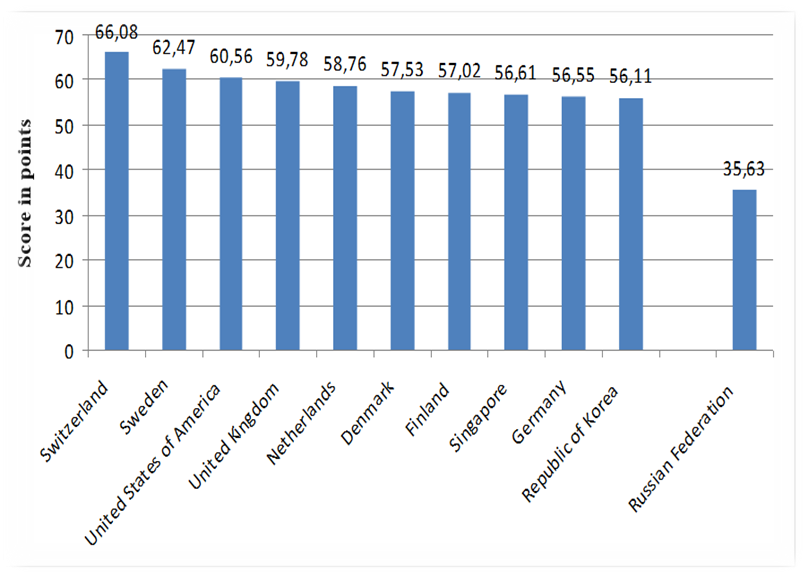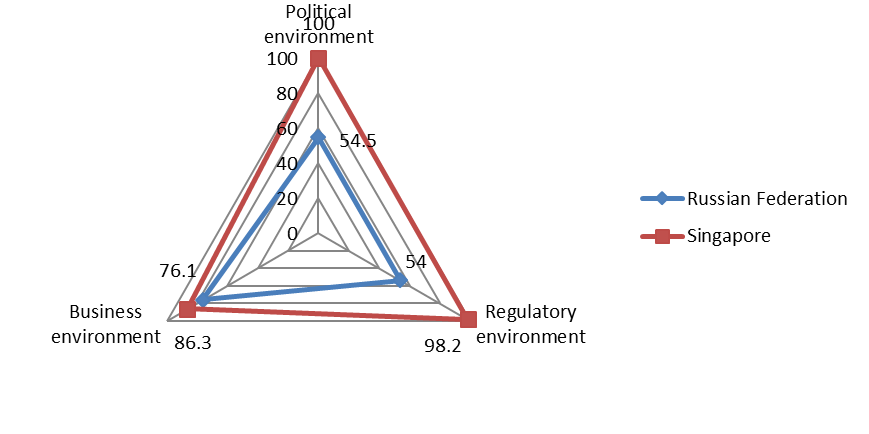Abstract
Both foreign and domestic scientists substantiated the need for transition from industrial economy to innovative economy in the late 1990’s. Implementation of innovations increases production efficiency, improves product quality, enables to withstand market competition and thereby ensure economic security. On the other hand, ensuring economic security is the basis for sustainable functioning and development. Thus, innovative development and economic security are interconnected. At present, the results of innovative development in Russia cannot be considered satisfactory in a number of indicators as compared with developed countries of the world level. The relevance of proposed article topic is justified by the need to improve state policy in the innovation sphere to ensure sustainable economy development and its protection from real and potential threats. In this regard, it is considered the state of innovative development of Russia in the system of the Global Innovation Index (GII). It is given comparative analysis of the levels of innovative development of Russia and the leading countries in the GII rating. Institutional factors influencing innovation activity and being threats to the economic security of Russia are analyzed in detail. The paper proposes possible solutions to raise the level of innovative activity that ensures the Russian economic security.
Keywords: Innovation index, institutional indicators innovative development, economic security, innovation index, institutional indicators
Introduction
Each state has to introduce new public institutions or change the old ones to accelerate socio-economic development under the influence of changing geoinformational factors according to the historical experience (Bierbrauer & Boyer, 2016). Nowadays it is necessary to know the principles of new world economy. And how it can influence the economy and what we can expect if we meet these new requirements (Novikov & Gregova, 2017).
Innovative technologies are very important for competition and economic relations between countries in the 21st century. It determines the economic security of each country (Zhulega et al., 2021). National competitiveness which is influenced by political and also socio-economic factors regulates the social well-being that can be attained by economic growth and investment into innovations being one of the most important the growth factor. The increase of growth opportunities for each technological order demands fundamentally new technologies (Sycheva et al., 2020).
Global competition sets completely new goals for the state in the field of ensuring economic security. The key one is the development of innovative technologies.
Problem Statement
In the conditions of the global crisis and the strengthening of economic sanctions against the Russian Federation by the United States and the European Union, the innovative orientation of the state's economic policy is of paramount importance, since achievements of science and technology, more than ever before, determine the dynamics of economic growth, the level of population well-being, competitiveness of states and degree of provision their national security. This makes it especially relevant to study the problems of development of innovative activities in our country.
Research Questions
The development of innovative technologies affecting the country economic security is provided for among the main directions of state policy in the field of ensuring economic security by the Russian Federation President Decree on strategy of economic security until 2030, section III, paragraph 15, paragraph 3. (The Russian Federation Presidential Decree № 208 as of May 17, 2017).
The study of the Russia occupied position in the field of innovations as compared with other countries contributes to decision-making on the management of innovative activities in priority areas for the state, their support and financing.
Assessment of the level of institutional factors of innovative development, assuming the country political stability, the government effectiveness and the legal system, the degree of complexity of starting a business largely predetermines the level of economic security and requires constant monitoring and comprehensive research.
Purpose of the Study
The aim of this study is to analyze the institutional aspects of innovative development based on indicators that are used when comparing innovation systems in the world arena to ensure the country's economic security in regards to current global changes and forecasts for the future development. The block of institutional indicators contains indicators that allow assessing the quality of institutions, as well as indicators by which one can judge the efficiency of institutions (Novikov et al., 2020).
Research Methods
The measuring methodology for the level of use of innovative technologies that provide for EC is reflected in the development and use of system of indicators.
There are currently no generally accepted criteria for assessing the level of innovative development. In Russian and international practice, there are different approaches used to monitor the dynamics of innovative development in the context of globalization.
Based on the study of available statistical sources, it is proposed to use Global Innovation Index (GII) as the main indicators for the analysis.
According to experts, GII is the most complete set of indicators for assessing the effectiveness of innovation in the global economy. This year the GII model includes 131 countries/economies, which represent 93.5% of the world’s population and 97.4% of the world’s GDP in purchasing power parity current international dollars (Global Innovation Index, 2020).
The GII comprises the innovation activity indicators, which are divided into areas of the main elements of the national economy. Total GII score received by a country is defined as the average of two sub-indices: “the sub-index of costs for innovation (institutions, human capital and research, infrastructure, development of the internal market, business development) and the sub-index of innovation results” (the results of development of technologies and the knowledge economy, the results of creative activity) (Gagulina et al., 2020, p. 04037).
According to the GII results in 2020, Russia ranks 47th place out of 131. According to globalization requisites and modernization opportunities, the Russian economy can be attributed to the "catching up" model (Armin et al., 2018). The results of proposed GII ranking of the ten leading countries and Russia are graphically summarized in Figure 1.

Information about the place of Russia in the GII in the main areas of innovative development over the past five years is given in Table 1.
Higher places in the rankings indicate poor results. Analysis of Russia's position in the GII over the period 2016-2020. shows a slight change in innovation activity in almost all areas. According to Table 1, Russia in the overall ranking has worsened its position by 4 points (in 2016 it took 43rd place, and in 2020 - 47th place out of 131). The worst in the ranking among the areas of innovative development is the direction "1. Institutions" (in GII-2020 it takes 70th place). Information on indicators of the direction "1. Institutions" is presented in Table 2.
The analysis of Table 2 shows the weaknesses of the innovation system in the institutional direction according to the "Regulatory environment" criterion, which ranks 95th place out of 131 countries, according to the indicators "Regulatory quality" and "Rule of law", ranking 105 and 114, respectively.
Clear comparison of Russia and Singapore, leading in terms of the factors of institutional direction of innovative activity, in the GII-2020 system, is shown in Figure 2.

Findings
The study results let us assess the current level of innovation activity in the Russian Federation in comparison with other countries. The indices of innovative development in the GII-2020 system allow one to see the weaknesses of the institutional factors of innovative development. Thus, we can form the priority directions of development to ensure sustainable development of the economy which lets raise economic security.
Conclusion
Nowadays the competitive positioning of a country ensures its economic security. To have economic influence each country has to develop innovative technologies. These principles are stated in the main directions of state policy in the field of ensuring economic security by the Russian Federation President Decree No. 208 as of May 17, 2017 "On the Strategy of Economic Security of the Russian Federation over the Period up to 2030".
The results of innovative development in Russia cannot be considered satisfactory. In the Global Innovation Index GII-2020 system, Russia ranks 47th place. Particularly weak positions in the direction of institutional factors. Indicators such as "Regulatory quality" and "Rule of law" require attention, ranking 105 and 114 respectively out of 131 countries. This poses a threat to economic security. Therefore, it is necessary to intensify innovation, taking into account the legislative and regulatory legal documents that regulate and stimulate innovation.
References
Armin, F., Becker, A., Dohmen, T., Enke, B., & Huffman, D. (2018). The Quarterly Journal of Economics. Uwe Sunde Global Evidence on Economic Preferences, 133(4), 1645-1692.
Bierbrauer, F., & Boyer, P. (2016). The Quarterly Journal of Economics. Efficiency, Welfare, and Political Competition, 131(1), 461-518.
Gagulina, N., Samoylov, A., Novikov, A., & Yanova, E. (2020). Innovation-driven development and quality of living under conditions of digital economy. In E3S Web of Conferences (Vol. 157, p. 04037). EDP Sciences. https://www.globalinnovationindex.org
Global Innovation Index. (2020). https://www.globalinnovationindex.org
Novikov, A. V., & Gregova, E. (2017). Institution Features of Economic Development During Globalization. In Globalization and its Socio-Economic Consequences (pp. 1757-1763).
Novikov, A., Zhulega, I., Drozdova, A., & Samoylov, A. (2020). Influence Of Informal Institutional Factors On Regional Economy. In European Proceedings of Social and Behavioural Sciences EpSBS (pp. 1273-1277).
Sycheva, E., Budagov, A., & Novikov, A. (2020). Urban infrastructure development in a global knowledge-based economy. In SHS Web of Conferences (Vol. 74, p. 03013). EDP Sciences.
The Russian Federation Presidential Decree № 208 as of May 17. (2017). On the Strategy of the Economic Security of the Russian Federation over the Period up to 2030, 157, 04037.
Zhulega, I., Sycheva, E., & Samoylov, A. (2021). The Use of Innovative Technologies to Ensure Economic Security of the Russia in the Context of Globalization. In SHS Web of Conferences (Vol. 92). EDP Sciences.
Copyright information

This work is licensed under a Creative Commons Attribution-NonCommercial-NoDerivatives 4.0 International License.
About this article
Publication Date
25 September 2021
Article Doi
eBook ISBN
978-1-80296-115-7
Publisher
European Publisher
Volume
116
Print ISBN (optional)
-
Edition Number
1st Edition
Pages
1-2895
Subjects
Economics, social trends, sustainability, modern society, behavioural sciences, education
Cite this article as:
Zhulega, I., Budagov, A., & Sycheva, E. (2021). Influence Of Institutional Factors Of Innovative Development On Economic Security. In I. V. Kovalev, A. A. Voroshilova, & A. S. Budagov (Eds.), Economic and Social Trends for Sustainability of Modern Society (ICEST-II 2021), vol 116. European Proceedings of Social and Behavioural Sciences (pp. 675-680). European Publisher. https://doi.org/10.15405/epsbs.2021.09.02.75

